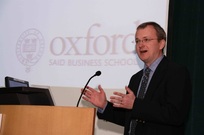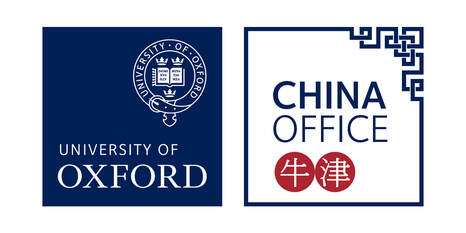Oxford China Academics
Oxford In China > Oxford China Academics > Eric Thun

Eric Thun is the Peter Moores Associate Professor in Chinese Business Studies at Saїd Business School and a Fellow of Brasenose College. His primary interest is the political economy of China. In his current research, Prof. Thun is analyzing how the structure of industries and markets in China affect the ability of Chinese firms to build capabilities. More generally, he is interested in the dynamics of competition in emerging markets. Prof. Thun received his BA from Princeton University in 1990 and his doctorate from Harvard University in 1999. After a year as a postdoctoral fellow at the MIT Industrial Performance Center, he returned to Princeton as Assistant Professor in the Woodrow Wilson School and Department of Politics. He joined Saїd Business School in 2005. In addition to teaching undergraduates at Brasenose, Prof. Thun teaches on the MBA, EMBA, and executive education programs at the Saïd Business School.
The difference between being an academic at Oxford and an academic in the US:
The biggest difference is that Oxford academics have two jobs: their College and their Department (which in my case is the Said Business school). This creates an administrative burden, and it is hard to explain the complexity of this place to American colleagues, but also a great deal of exciting variety. I’ll run from teaching a group of senior executives from all around the world at the business school to a tutorial with two first-year students at Brasenose.
On how he became interested in the study of business and political economy in China:
I began studying China in graduate school in the early 1990s and was motivated largely by a desire to understand the process of economic development. This was a time when the Chinese leadership was eager to imitate the state-led approach of neighbors such as Japan and Korea, but it was also trying to pull the state out of the economy as it made the transition away from state planning. Understanding the inherent tension that resulted was the motivation for my PhD dissertation. The other attraction, of course, was the immensity of the challenge: this was before the Chinese economy had taken-off, but you knew that no matter what happened, the social, political, and economic implications of reform would be profoundly important for the world.
Xi Jingping has recently emphasized that innovation should be the driving force in China’s development and economic restructuring. How do you see China transitioning from a country focused on low-cost manufacturing to one that is driven by innovation?
There is no question that China has the capacity for innovation, and anyone who has spent time in China is aware of this. Currently, much of this is focused on the domestic market: local firms understand the market and have the flexibility to respond quickly to the market. This drives a lot of innovation. The key question is the extent to which the system encourages rather than constrains innovation; resources and opportunities have to flow to the firms that are the most innovative, rather than those that have the best political connections.
And what insights do you have for foreign firms who would like to compete in the rapidly growing Chinese market?
The challenge for foreign firms is that their domestic competitors are really hard to beat and it takes real commitment in order to win in the Chinese market. A core problem is that there is not a single, simple key to success in China. It is not just a matter of localizing the supply chain or understanding your customers or shifting design work to China. In order to succeed, firms often have to develop an entirely new business model that integrates all of these elements, and doing so requires a great deal of commitment (and trust) from global headquarters.
The difference between being an academic at Oxford and an academic in the US:
The biggest difference is that Oxford academics have two jobs: their College and their Department (which in my case is the Said Business school). This creates an administrative burden, and it is hard to explain the complexity of this place to American colleagues, but also a great deal of exciting variety. I’ll run from teaching a group of senior executives from all around the world at the business school to a tutorial with two first-year students at Brasenose.
On how he became interested in the study of business and political economy in China:
I began studying China in graduate school in the early 1990s and was motivated largely by a desire to understand the process of economic development. This was a time when the Chinese leadership was eager to imitate the state-led approach of neighbors such as Japan and Korea, but it was also trying to pull the state out of the economy as it made the transition away from state planning. Understanding the inherent tension that resulted was the motivation for my PhD dissertation. The other attraction, of course, was the immensity of the challenge: this was before the Chinese economy had taken-off, but you knew that no matter what happened, the social, political, and economic implications of reform would be profoundly important for the world.
Xi Jingping has recently emphasized that innovation should be the driving force in China’s development and economic restructuring. How do you see China transitioning from a country focused on low-cost manufacturing to one that is driven by innovation?
There is no question that China has the capacity for innovation, and anyone who has spent time in China is aware of this. Currently, much of this is focused on the domestic market: local firms understand the market and have the flexibility to respond quickly to the market. This drives a lot of innovation. The key question is the extent to which the system encourages rather than constrains innovation; resources and opportunities have to flow to the firms that are the most innovative, rather than those that have the best political connections.
And what insights do you have for foreign firms who would like to compete in the rapidly growing Chinese market?
The challenge for foreign firms is that their domestic competitors are really hard to beat and it takes real commitment in order to win in the Chinese market. A core problem is that there is not a single, simple key to success in China. It is not just a matter of localizing the supply chain or understanding your customers or shifting design work to China. In order to succeed, firms often have to develop an entirely new business model that integrates all of these elements, and doing so requires a great deal of commitment (and trust) from global headquarters.
You created the first international module for the Oxford EMBA programme which is based in China, allowing students to combine classroom instruction with collaborative sessions with companies in China. Tell us more about this programme and how it sets the Oxford EMBA apart from others.
When I teach about China in Oxford, the challenge is conveying the excitement of what is happening in China to students in a classroom. It obviously is far more effective to bring them to China and let them experience it for themselves! I give the students context and conceptual frameworks for thinking about what they see, but then when we visit firms, the students drive the discussions themselves. The Oxford network in China plays a key role in this because many of the firms that we visit have Oxford ties.
When I teach about China in Oxford, the challenge is conveying the excitement of what is happening in China to students in a classroom. It obviously is far more effective to bring them to China and let them experience it for themselves! I give the students context and conceptual frameworks for thinking about what they see, but then when we visit firms, the students drive the discussions themselves. The Oxford network in China plays a key role in this because many of the firms that we visit have Oxford ties.

The Said Business School is hosting the second Oxford China Business Forum this month in Beijing. What is the objective of this Forum and what are some of the highlights Oxford alumni can expect?
The objective of the Forum is to use the convening power of Oxford to bring together thought leaders, influential entrepreneurs from Chinese and multinational firms, and alumni of the University to discuss the key challenges facing China. One of these challenges, for instance, is mixed-ownership reform in the state sector, and I’m really looking forward to hearing a discussion between Stephen Green (formerly Chairman of HSBC and Minister of State for Trade and Investment in the UK), Colin Mayer (my colleague at SBS and a leading expert on corporate governance), Chu Xuping (the Director of the SASAC Research Centre), and the Chairmen of several leading state firms.
Who do you admire?
The millions of entrepreneurs who have transformed China.
Interviewed in October 2014
The objective of the Forum is to use the convening power of Oxford to bring together thought leaders, influential entrepreneurs from Chinese and multinational firms, and alumni of the University to discuss the key challenges facing China. One of these challenges, for instance, is mixed-ownership reform in the state sector, and I’m really looking forward to hearing a discussion between Stephen Green (formerly Chairman of HSBC and Minister of State for Trade and Investment in the UK), Colin Mayer (my colleague at SBS and a leading expert on corporate governance), Chu Xuping (the Director of the SASAC Research Centre), and the Chairmen of several leading state firms.
Who do you admire?
The millions of entrepreneurs who have transformed China.
Interviewed in October 2014

